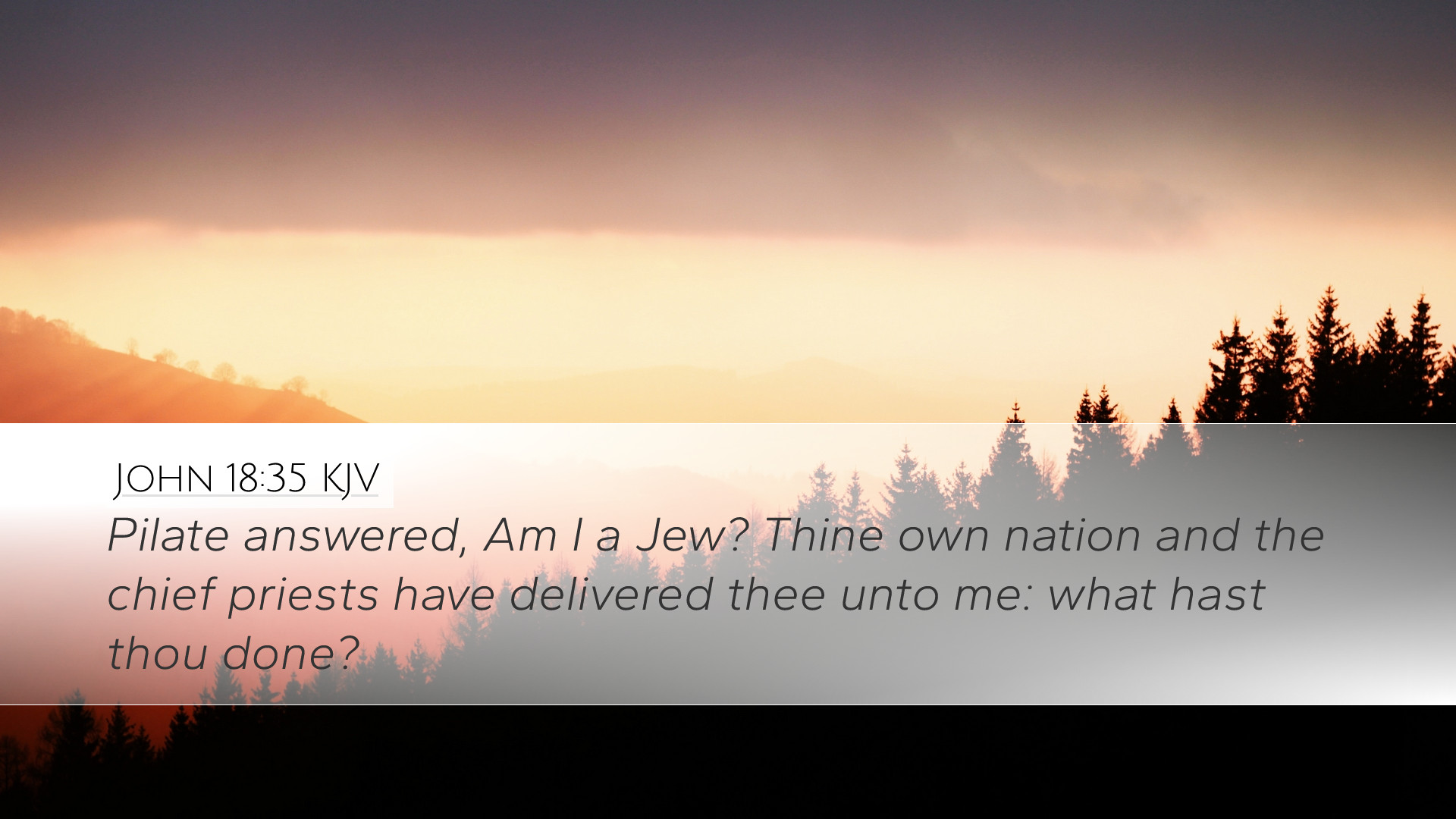Commentary on John 18:35
Text of the Verse: “Pilate answered, Am I a Jew? Thine own nation and the chief priests have delivered thee unto me: what hast thou done?” (John 18:35, KJV)
Contextual Overview
This verse occurs during the trial of Jesus before Pontius Pilate, the Roman governor. It captures a significant moment where Pilate, confronted by the gravity of the accusations laid against Jesus, seeks clarification on the nature of the charges. The exchange reveals not only the political and religious tensions of the time but also the misunderstanding between Jesus' mission and Pilate’s perceptions.
Insights from Public Domain Commentaries
Matthew Henry’s Commentary
Henry emphasizes the contrast between Pilate’s secular authority and Jesus’ spiritual kingship. He notes that Pilate’s inquiry, "What hast thou done?" highlights the governor’s perplexity regarding the accusations brought by the Jewish leaders. Instead of probing into the spiritual implications of Jesus’ actions, Pilate focuses on political ramifications, which speaks to the larger theme of misunderstanding that permeates the Passion narrative.
- Political and Spiritual Disconnect: Pilate’s question indicates a disconnect between the Jewish religious leaders and Roman authority, illustrating how the spiritual truths of Christ’s mission were lost on Pilate.
- Reflections on Leadership: Henry reflects on the role of leaders; Pilate showcases a lack of moral courage, as he remains indifferent to the moral implications of condemning an innocent man.
Albert Barnes’ Notes on the New Testament
Barnes elaborates on Pilate’s role as a Roman governor and the cultural confusion surrounding the Jewish customs and laws. He underscores Pilate’s non-Jewish status, which positions him as an outsider unable to comprehend the nuances of Jewish law and tradition. His retort, "Am I a Jew?" underscores a sense of detachment from the events surrounding Jesus’ trial.
- Judgment and Ignorance: Barnes interprets this moment as reflecting Pilate's ignorance about the spiritual significance of the case. Pilate’s failure to see Jesus as more than a political threat reflects broader themes of blindness to truth in the Gospel narrative.
- Cultural Commentary: This exchange showcases the societal divide between Jewish expectations of a Messiah and Roman understandings of insurrection, thus highlighting the varied responses to Christ’s identity.
Adam Clarke’s Commentary
Clarke focuses on the psychological aspects of Pilate’s question, interpreting it as a moment of personal introspection. He argues that Pilate’s lack of commitment to justice emerges from a self-serving disposition aimed at preserving his political stature. Clarke further elaborates on the term “delivered” used by Pilate, suggesting a sense of betrayal felt by Jesus from his own people.
- Pilate's Dilemma: Clarke notes that Pilate is caught between his duty to uphold Roman law and the pressure from the Jewish leaders, representing the moral dilemmas faced by those in positions of power.
- Human Betrayal: The acknowledgment of betrayal by the Jewish leaders showcases the tragic elements of the passion narrative, suggesting a deeper spiritual abandonment that transcends historical events.
Theological Implications
The conversation between Pilate and Jesus opens avenues for deep theological reflection. The questions posed challenge believers to consider the nature of true authority and the kingdom of God in contrast to worldly power. John 18:35 acts as a lens through which the duality of Jesus’ kingship can be understood: transcendent yet misunderstood.
- Christ’s Identity: The failure of Pilate to recognize Jesus' identity as King marks a poignant moment in the Gospel, indicating the broader rejection of Christ’s sovereign claim.
- Understanding Divine Justice: This dialogue underscores the tension between divine justice and human legalism, provoking consideration of how believers engage with societal norms while upholding the tenets of their faith.
- The Role of the Church: The church today must confront similar questions posed by Pilate, reflecting on its response to societal challenges while remaining faithful to Christ’s teachings.
Practical Applications for Ministry
For pastors, students, and theologians, John 18:35 serves as a foundational text illustrating the complexities of faith in the face of worldly authority. The exchanges prompt several practical considerations:
- Encouragement to Seek Truth: Believers are urged to actively seek the truth of Christ in their own lives, especially in contexts that may seem politically or morally challenging.
- Empathy for the Marginalized: Recognizing the human struggles depicted in the trial narrative allows for greater empathy toward individuals facing injustice today.
- Engagement with Culture: The importance of understanding cultural contexts is paramount; the church must wisely engage with society, akin to administrators like Pilate but informed by divine wisdom.
Conclusion
John 18:35 encapsulates the intersection of faith, politics, and identity. As Pilate wrestles with the identity of Jesus, readers are called to confront their own understanding of Christ amidst societal influences. Through insights drawn from esteemed commentaries, this verse invites deeper reflection on the implications of Jesus' kingship and the church's role in the world.


